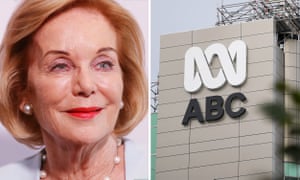Extract from The Guardian
Exclusive: Buttrose mounts robust defence of broadcaster’s independence in response to questions about Four Corners’ episode Inside the Canberra Bubble
The ABC chair, Ita Buttrose, has accused the government of a pattern of behaviour which “smacks of political interference” in a robust defence of the public broadcaster’s independence, according to a draft of a letter responding to a barrage of Coalition complaints about the Four Corners program Inside the Canberra Bubble.
In the program broadcast last month, the journalists Louise Milligan and Lucy Carter investigated complaints about attorney general Christian Porter, including an alleged history of sexist and inappropriate behaviour towards women, and an affair the acting immigration minister, Alan Tudge, had with a female adviser in 2017.
Three weeks later the communications minister, Paul Fletcher, demanded Buttrose respond to 15 detailed questions about the program and asked whether it met the standards of accurate and impartial journalism.
In a draft of her response to Fletcher, seen by Guardian Australia, Buttrose details a pattern of behaviour which she describes as “very disrespectful” from a minister of the crown.
Every one of the 15 complaints is rejected and the letter corrects some of the assertions made by Fletcher.
Buttrose says she was disappointed the minister for communications posted on Twitter a letter to her before she had a chance to read it, and says it is the third time this year “your correspondence to the ABC has been publicly revealed before I had been given the courtesy of reading it”.
Buttrose says the Morrison government’s numerous attempts to stop the program going to air are “not consistent with respect for the role of an independent public broadcaster”.
The government’s alleged pressure to halt the show included a senior adviser calling an ABC board member about the program, Buttrose writes, and government staffers calling the managing director, David Anderson, to raise their concerns after Milligan and Carter sought responses from Porter and Tudge.
The two ministers refused interviews, instead firing off “a whole lot of off-the-record emails in which they tried to emotionally manipulate and threaten us”, Milligan has alleged.
There was also “an extraordinary public interrogation” of Anderson by senators at a parliamentary hearing “about a program they had not seen”, Buttrose writes.
She writes that the Fletcher letter and the earlier alleged attempts to halt the program’s broadcast at the eleventh hour “go well beyond normal inquiry” and impinge on the statutory independence of the ABC.
In the letter, which he demanded be answered by 14 December, the board was asked to explain why a “consensual relationship” between a politician and a staff member, which took place before Malcolm Turnbull’s so-called bonk ban was imposed in 2018, was considered newsworthy.
The reply to Fletcher says while the ABC Act requires the ABC board to ensure that the gathering and presentation of news is accurate and impartial it also requires the board to “maintain the independence and integrity of the corporation”.
“This board takes both of these responsibilities most seriously,” Buttrose writes.
“Politicians and their families certainly have a right to privacy,” she said. However, she went on to say that as elected representatives, politicians are highly relevant “when considering the public interest”.
Last month Buttrose warned of an escalating campaign targeting the public broadcaster and labelled claims it ran agendas and campaigns against free enterprise as “malicious garbage”.
On Sunday Fletcher told the ABC’s Insiders program he had no intention of sacking the chair of the ABC and it was “entirely appropriate” that as minister with responsibility for the ABC he should ask the board and the chair such questions.
“When I receive her response, I will give it the careful consideration that it deserves, and I do expect a serious and substantive response from one of the most serious and substantive figures in the Australian media landscape,” he said.
A spokesman for Fletcher told Guardian Australia on Monday morning the minister “looks forward” to receiving the letter.
Other correspondence to the ABC which was allegedly released before the ABC received it included questions given to the Australian’s investigations editor, Sharri Markson, about whether the program had used private investigators, and a letter that encouraged the ABC to consider selling its inner-city offices, which was leaked to the Sydney Morning Herald before the ABC received it.
Former prime minister Kevin Rudd congratulated Buttrose for “calling out the interference”.
“Full marks to Ita Buttrose for standing up for the independence of the corporation,” Rudd told the ABC news channel.
Greens media spokeswoman Sarah Hanson-Young said Fletcher’s role was to advocate and protect the independence of the ABC inside cabinet not do the bidding of “ideologues trying to tear down the public broadcaster”.
“All Australians should be angry that this government is more obsessed with attacking the ABC rather than dealing with bad behaviour in their own ranks,” Hanson-Young told Guardian Australia.
“Political interference in the public broadcaster has no place in our democracy.”

No comments:
Post a Comment